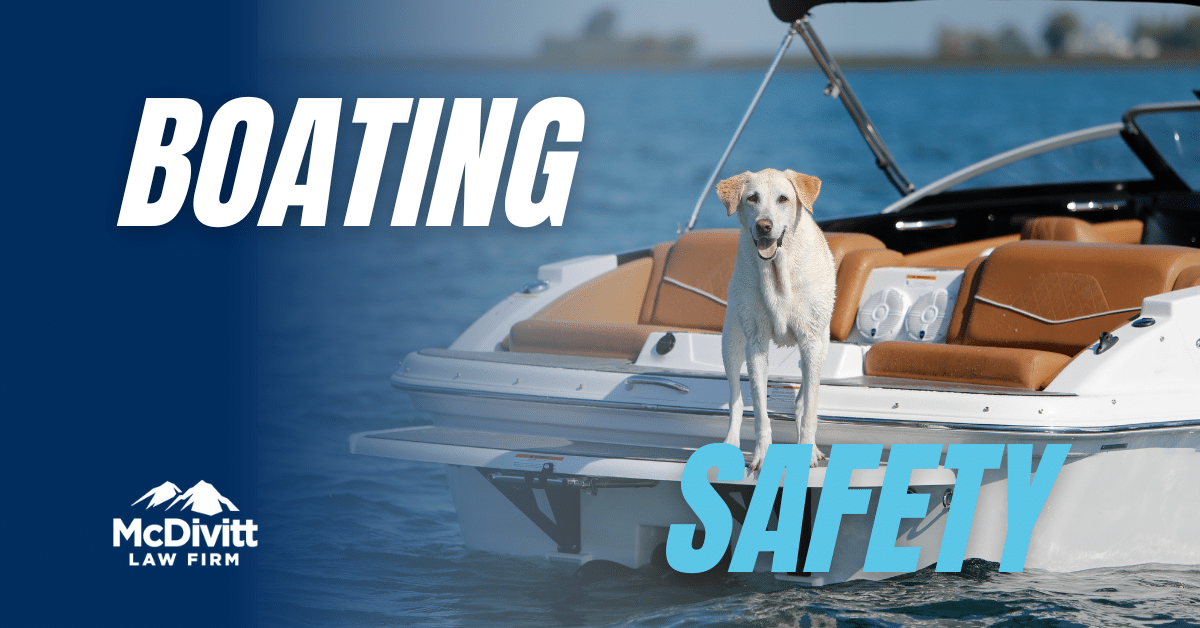
Since summer is right around the corner many Coloradans will be looking to have some relief from the heat. With all of the rivers, lakes and reservoirs located here in Colorado, it is only appropriate that Coloradans take to the water for some fun this spring and summer. It is also important to be aware of the regulations and safety measures that accompany spending a day out on the water boating. Colorado boating laws are codified in Title 33 of the Colorado Revised Statutes (C.R.S.), dealing with parks and wildlife. The statutes cover such areas as boat registration or “numbering,” equipment requirements on boats, minimum age of motorboat operators, prohibited operations on a water vessel, operating a vessel while under the influence (BUI), rules regarding collisions and accidents, rules regarding water skis and other recreational devices, and more. Equipment Requirements This is the section that covers equipment requirements, which states that you cannot operate a personal watercraft (a motorboat) unless each person aboard is wearing a United States Coast Guard approved personal flotation device. Additionally, you are not allowed to operate a motorboat that has entered the water unless each child under the age of thirteen aboard the vessel is wearing a personal flotation device approved by the United States Coast Guard, the exception to that rule is if the child is located below deck or in an enclosed cabin. Furthermore, you must have one approved personal floatation device available for every person aboard the motorboat. Minimum Age of Motorboat Operators This section lays out the minimum age requirements to operate a motorboat, which is sixteen years old. There is an exception to that age requirement, and that is a person between the ages of fourteen and sixteen years old can operate a motorboat if they meet two conditions:
- They have completed a boating safety course approved by the division of parks and wildlife; and
- They have their boating certification from the boating safety course in their possession.
2024 Update The Colorado Legislature has recently enacted a change to the age requirement statute that will take effect on June 1, 2024. The new law changes the minimum age to operate a motorboat from sixteen to eighteen years old. Operating a vessel while under the influence In this section, the legislature makes it illegal to operate a vessel if you have a blood alcohol content of 0.08 or more. A violation of this section is considered a class 2 misdemeanor. Water Skis, Aquaplanes, surfboards, inner tubes, stand-up paddleboards, and similar devices This section regulates the use of water skis and similar devices while out on the water and contains a few of the following rules:
- No person shall operate a vessel, towrope or other device which control the direction speed or location of water skis or any similar device in such a way as to cause such device to collide with or strike against any object or person.
- No person shall operate, manipulate, or ride water skis or any similar device towed behind a vessel in a careless or imprudent manner without due regard for other traffic and all circumstances on the water.
- Any person on water skis or a similar device shall wear a personal flotation device.
- A person shall not operate, manipulate, or ride water skis or any similar device while under the influence of alcohol or any controlled substance.
Boating Tips
- Make sure to have an approved life jacket available and ready to use.
- Check the weather forecast and be aware of any adverse weather conditions.
- Wear appropriate clothing.
- Operate the boat responsibly.
- Make sure that your boat has all of the essential and required safety equipment:
- Life Jacket
- Fire Extinguisher
- Cell Phone
- Navigation Lights
- Sound Signaling Devices
- Muffling System
- Backfire Flame Arrestor
- Distress Signals
- Flares
- Flashlight
- Radio
- Spare Batteries
- First Aid Kit
- Anchor/Cable
Suggestions to Boat Safely Operating a boat safely involves following proper procedures and taking necessary precautions to ensure the safety of yourself, your passengers, and others on the water. Here are some essential guidelines to keep in mind when operating a boat:
- Obtain proper training: Take a boating safety course to learn the rules, regulations, and best practices for operating a boat. Many countries require a boating license or certification, so make sure you meet the legal requirements.
- Wear life jackets: Ensure that you and all passengers wear properly fitted life jackets or personal flotation devices (PFDs) at all times while on board. Make sure you have enough life jackets for everyone on the boat, including children.
- Check the weather: Before heading out, check the weather forecast and pay attention to any advisories or warnings. Avoid boating in severe weather conditions, high winds, or storms, as they can be dangerous.
- Prepare safety equipment: Ensure your boat is equipped with essential safety gear, including a fire extinguisher, distress signals (such as flares), a first aid kit, a throwable flotation device, and an anchor. Make sure you know how to use each piece of equipment.
- Maintain proper speed: Follow speed limits and adjust your speed based on the water conditions, traffic, and visibility. Be mindful of other boats, swimmers, and obstacles in the water.
- Avoid alcohol and drugs: Never operate a boat while under the influence of alcohol or drugs. They impair judgment, coordination, and reaction time, increasing the risk of accidents.
- Be aware of navigation rules: Familiarize yourself with the navigation rules and adhere to them. Understand right-of-way, overtaking, and crossing situations. Keep a safe distance from other boats, especially in congested areas.
- Stay alert and avoid distractions: Keep a lookout for other boats, swimmers, buoys, and any potential hazards. Avoid distractions such as texting, using your phone, or operating the boat while fatigued.
- Use caution when docking: Practice docking your boat safely. Approach the dock slowly, and be mindful of other boats, swimmers, and objects in the area. Use fenders and dock lines to secure the boat properly.
- Regular maintenance and inspection: Ensure your boat is in good working condition by performing regular maintenance checks. Check the fuel, engine, lights, electrical systems, and other equipment before every trip.
Remember, these guidelines are general recommendations. Familiarize yourself with local boating regulations and specific safety requirements in your area to ensure you comply with all relevant laws. We want everyone to have a safe and fun summer out on the water. It is important to remember that if you are involved in a boating accident at no fault of your own, be sure to contact McDivitt Law Firm to help you out.
Learn more about personal injury.


